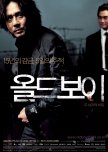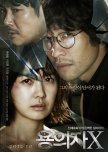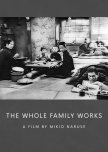
This review may contain spoilers
"Even though I'm no better than a beast, don't I deserve the right to live?"
Oldboy was an unflinching violent revenge film that would have made a Greek tragedy blush. I watched this film during its 20th anniversary year and the production values held up. The storytelling's misogynistic overtones dated it and didn't hold up as well. I've not mentioned any of the major plot twists in this review.Choi Min Shik as the deeply flawed Oh Dae Soo did a marvelous job transitioning from drunk, philandering husband to confused, bitter prisoner to vengeful vigilante searching for answers. Yoo Ji Tae made a decidedly creepy and vengeful Lee Woo Jin. The two men whose lives were intertwined by a careless comment were at their best when playing cat and mouse.
The action scenes showed that nearly anything can be transformed into a weapon. You may never see toothbrushes the same. A hallway fight leading to an elevator fight were truly iconic and I can see where they influenced many other fight scenes in television and film. Dae Soo's commitment verging on insanity was frighteningly powerful.
Where the film failed me were the women's roles. Their very existence seemed to be as vessels of the men's lust and "love". They played into the men's circle of vengeance with no real identities. Of course, they were necessary to have several gratuitous bare breast shots and being threatened with sexual violence. Mi Do accepted it as perfectly normal when Dae Soo attempted to rape her. And the final plot twist, sick as it was, once again left her without any choice or agency of her own.
While Woo Jin's revenge long game was vile, the film seemed determined to make Dae Soo as unsympathetic as possible from beginning to end. His one moment of empathy was cut short by self-gratification. In the end the film doubled-down on his troubling personality. There was no redemption arc, no moment of healing, no positive character growth, only primal animal instincts. As a thought exercise in tearing away the veneer of civilization, the film succeeded in a disturbing manner.
9/2/23
Was this review helpful to you?

This review may contain spoilers
"It's human to lie. Most of the time we can't even be honest with ourselves."
*I have updated this review and my score on a second viewing. My added thoughts follow the original review.*I'm going to post a short, heretical review of this much lauded film. Much as I wanted to love this film, it had a major stumbling block for me in the story.
That the movie is technically well made is not up for debate. It was a well made movie from 1950. I've enjoyed other Kurasawa movies. I love Mifune Toshiro. Rashomon might have been a profound movie experience for me if the story had not been told through such a narrow male lens.
The Rashomon effect is still used to describe eye witnesses giving different testimony to a single event. People do lie to each other, to the court, and to themselves because of their egos, fears, survival instincts, and inability to face the truth. The film showed this human frailty quite poignantly. The cinematography, music, and acting were exceptional for the time. Mifune's performance as the bandit tinged with madness was unexpected but quite well done although at times it did veer into Ernest T. Bass territory.
Where I diverge from the fans of this movie is in one particular aspect of the film. It repeatedly showed and told the viewer that women were not just physically, but morally weaker than men and were not to be trusted. This was even more despicable because the men were shown as being morally corrupt so the raped woman was even lower than they were. Twice we come away with the woman in the story enjoying her rape and trying to use it to her advantage. In different flashbacks she pit the two men against each other or asked the bandit to murder her husband. That she was willing to go with her rapist was beyond comprehension to me, unless she was planning on murdering him in his sleep. I understand that during the period of time the movie was set in, and even in 1950, a raped woman was looked on as damaged goods. (The Comfort Women after WWII were looked down upon and expected to commit suicide and often shunned by their families.) If the director had convinced me that she was doing what she had to do to survive I might have been able to stomach that part of the story better, but as it was shown it built a fire of anger in my chest, not at the woman but the storyteller for perpetuating some of the most dangerous myths about women and rape. Given, it was a common view of the time, but it didn't make it any less reprehensible to me.
Only in the woman's version does she not come across as a conniving "whore", perhaps only a murderous woman to save herself, but we are also told to not believe a woman's story immediately thereafter.
As much as I tried to overlook the misogynistic view of women and rape in this movie to enjoy the rest of the story, I couldn't escape it. Rashomon, despite all the glorious reviews I've read across the internet, failed to live up to them in my experience.
2 September 2021
*Update on my review:*
Having now watched all but one of Kurosawa’s films for which he was the writer/director I decided to revisit this film about the unreliability of eye witness accounts and how truth is often relative, enigmatic, and subjective. I struggled with it mightily the first time because of how women were not only looked down upon but treated with outright hostility. I wanted to see if my opinion would change on a second viewing of this famous and well-loved film.
When asked about Rashomon, Kurosawa had the following comments: “Human beings are unable to be honest with themselves without embellishing…(these characters) are the kind who cannot survive without lies to make them feel they are better people than they really are.” “The human heart is impossible to understand.”
The message that people are weak and even lie to themselves for a variety of reasons still resonates. Also, how perspective and memory are faulty witnesses still holds true. I would have to add that perhaps Kurosawa was blind to the depths of his own gender bias. Other Japanese directors from this time frame and even earlier had made films showing how the patriarchal society caused women to suffer, I guess I was just expecting more from one of my favorite directors. I’ve read interviews with him about this film and he discussed at length how they suffered from leeches while filming in the forest, but not even a brief comment about the trauma or suffering rape causes a woman or how he wanted to show the inequality women suffer from. Instead Tajomaru is romantically described as a womanizer.
Social reform, individual responsibility, and equality were important points in many of Kurosawa’s films. Apparently, just for men. Masago’s rape was only viewed as a crime against her husband, and yes, I know this would be historically accurate. I was just looking for a hint of sympathy for her from any of the male characters since she was the only woman in the film. Her testimony in court was dismissed as irrelevant immediately. When she testified, she didn’t even mention her rape because either she knew no one would care or the writers knew that. The only crime was the samurai's death. The male rape fantasy that women really like it and want to be dominated was still appalling. Just one flicker of disgust from the men telling the story to the peasant, anything to tip the hand that her treatment was inexcusable, but nothing. Because all of the voices except one telling the story or judging it were male—the witnesses, the judge, the writers, the director---Masago’s witness was all but ignored. Masago's only weapon against the dominating men was her sexuality, all she had to try and salvage her situation with and save her life. Perhaps Masago was diabolically cruel and cunning, pitting two men’s penises and swords against each other for her own pleasure, her rapist and heartless, cowardly husband, but as was pointed out, “It’s human to lie. Most of the time we can’t even be honest with ourselves,” so I’m afraid I can’t even believe the actor (character) who usually played the moral compass in Kurosawa’s films.
I did bump my score up because this is a culturally important film and it was well made, but honestly, and still unpopularly, I didn’t like it any better the second time around. From my own biased witness on this film, if Kurosawa had been making a culturally relevant film that also purposefully highlighted the ruthless way rape victims were treated and the stunning disregard for women instead of reinforcing dangerous beliefs, I’d have rated this much, much higher.
11 June 2024
Was this review helpful to you?

This was almost non-stop Kaiju battles as monsters from the previous 50 years showed up to do battle with Godzilla, including the abomination from the US Godzilla (1998). A who’s who of monsters from the Godzillaverse---Hedorah, Rodan, Kamacuras, King Ghidorah, Manda, the aforementioned Zilla and many others. Mothra even showed up to bat clean-up with Gigan.
There was a lot to love in this movie. The humans were the most interesting of any of the Godzilla movies I’ve watched. It had aliens and mutant humans and futuristic weapons. Kitamura Kazuki as a bad alien with even badder guyliner was over the top. He looked like he was having as much fun making the movie as I had watching it. Don’t expect Oscar worthy performances, it’s not that kind of movie.
How could I not love a Godzilla movie that included my second favorite niche genre-kung fu in it?
Yes, the story could be a bit of a mess, but was easy to follow. The director unashamedly included a lot of the science fiction fads from previous years, the Matrix, Star Wars, Independence Day, Alien, and Jules Verne, among others. Sometimes it worked, sometimes it didn’t. No doubt there were moments of pure cheese. They also must have spent most of their money on the monsters, sets, and CGI because the music sounded like some guy hitting random notes on a synthesizer. The non-stop action from beginning to end could be draining and there were times when Godzilla was absent during a lot of the action with other monsters and the aliens. However, when Godzilla did appear, he showed why he was a force to be reckoned with.
Godzilla: Final Wars features guys in rubber suits and miniaturized cities and vehicles, just as the Godzilla Genie intended them to be from this era. On Godzilla’s 50th anniversary and retirement, it was appropriate. Final Wars was a monster mash that was fun and entertaining from beginning to end.
Was this review helpful to you?

"Time flows like water aging our lives"
Full Ship was a 1967 film set in a fishing village on a remote island. Poverty and tradition kept the islanders in a vicious cycle with seemingly no way out.Gom Chi is a fifty-year-old captain of a fishing boat and the father of new baby boy. Two of his three grown sons died at sea while the third refuses to sail. The sailors and Gom owe money to the owner of the boat who takes most of their haul to pay for gas and union fees. If they don’t catch fish, not only do they not get paid, they owe for the use of the boat. They are paid pitifully even when a “full ship” returns, sometimes only hulled barley. Gom Chi dreams of owning a boat and when his boss finds out, calls in Gom Chi’s debts.
Full Ship demonstrated the trials of living in a subsistence community and much like old coal mine towns where people owed their soul to the company store, the villagers were always in debt to the boat owners. Despite having lost two sons to the sea, Gom Chi could not fathom why his son Do Sum wouldn’t join the other men on the boats. Villagers and family whispered that time in the military and his education had made him “wild.” Gom’s wife did not want either Do Sam or her new baby to become bewitched by the sea as Gom Chi had. Do Sam’s sister, Seul Seul, was not opposed to leaving the island, but her fiancé Yeon Cheol was happy eating yams and being with her, with no desire to move to “land.” Beom Soe, a former islander who made money on land, came back and had his gaze set on Seul Seul. He also brought a dark secret with him.
The last twenty minutes were dominated by tragedy after tragedy as the Dragon King reminded the villagers that they did not control the sea. And just as with the miserly boat owner, the bill for depending on the sea, came due.
“To escape from an inch of regret, to leave behind an inch of suffering, those people were thrown into the providence of the sea.”
2 July 2024
Was this review helpful to you?

Who's your daddy? Or brother? Or lover?
One Fine Day boasted a fine cast and one of the messiest plots I’ve seen. Starring Gong Yoo, Namkoong Min, Lee Yun Hee, and Sung Yoo Ri, the writers didn’t have to do much to develop a story interesting enough to showcase their young cast’s talents but decided instead to make the story as ridiculous and melodramatic as possible.I usually give a brief synopsis of the drama so that my review makes some sense but this story will give you emotional whiplash with the way it starts and drops story threads and then completely changes them. Geon and Ha Neul are stepsiblings-no blood relation-who have been separated for 15 years. Tae Won and Ha Neul/Hye Won are siblings via adoption. Geon just wants to be her brother or so he says. Tae Won is a creepy incestuous molester. Gang Dong Ha is Ha Neul’s boss at the aquarium where she works and he is also in love with her. Hyo Ju is the girl Geon grew up with after his parents died and his dad’s driver took him to live in Australia. Hyo has a heart condition and is cuckoo, obsessively in love with Geon. Geon may or may not be reconnecting with Ha Neul because her adoptive family has money and Hyo Ju needs an expensive surgery. Ha Neul’s adoptive father may hold the key to what happened to Geon’s father.
Gong Yoo, when he wasn’t having to play the yelling possessive brother, gave a strong performance. Namkoong Min was entertaining as the charming boss with a past. I couldn’t help but root for him. Both men sported their BoF style haircuts before BoF came out. Sung Yoo Ri only had to display three emotions-surprised, sad, and “where did I leave my wallet?” Nothing any deeper as Ha Neul had no lasting emotional trauma from being molested. This was prime time for wrist grabbing in dramas. This girl was yanked from pillar to post throughout the drama. They even pulled off the complex double wrist grab. In one scene I saw bruises on her arms, no surprise where those came from. I’m not a fan of the wrist grab, I find it a dominant move that is degrading.
Hyo Ju will go down as one of the most selfish, manipulative characters in drama history. Lee Yun Hee did a good job of making me loathe her character. Yoo Ha Joon was excellent as the creepy, incestuous brother who had a scene with his dad that the drama The Heirs lifted straight from. And Jung Dong Hwan who would later play the wealthy lemon sucking dad in The Heirs played the wealthy lemon sucking dad here. The drama couldn’t decide whether to make him a villain or sympathetic. No sympathy from me, he knew his son was creeping on Ha Neul/Hye Won and did nothing about it.
The biggest problem with this drama was that it had no commitment and follow-through. The plot was overly complex and never fully explained. I kept waiting for the big flashback to show exactly what happened from the guilty party’s viewpoint, but it never happened. Geon prepaid for Hyo Ju’s surgery in Australia but she refused to have it when he left to find his sister. That money was still available, so why the proposed scam on Ha Neul’s family? Geon made some inexplicable decisions near the end of the drama, that truly made no sense. Even his motives toward Ha Neul took most of the drama to come to the surface. He and his found family brother went to work for Ha Neul’s adoptive father, but were never at work. Ha Neul worked at the aquarium but was hardly ever there except to mope in front of the fish so that Gang could comfort her. Her adoptive family was seriously twisted but she kept going back to them to act like a good daughter.
There’s a lot to unload with this drama, mainly because people’s motivations changed from minute to minute. Also, the secrets they knew changed which completely overrode their prior actions. There were plot holes big enough for a fleet of Mack trucks to drive through. One Fine Day was like a rollercoaster ride with no seatbelts. I was able to hang with the story and get some enjoyment out of it for most of the drama until the last few episodes when they completely ran that ride off the rails. If you like to watch pretty people and/or pretty fish, have a very flexible neck for when the ride changes directions, you could try this drama, but I suggest giving the Tilt-a-Whirl a chance instead.
26 June 2024
Was this review helpful to you?

"Even if you solve this problem, no one will be happy"
Perfect Number was an entertaining thriller where the genius was neither a serial killer nor a super cop. Just a lonely mathematician whose lifetime obsession with solving *Goldbach’s Conjecture* had left him despondent. Female director Bang Eun Jin, helmed this 2012 film, one of her half a dozen directorial efforts.Kim Suk Go spends most of his waking moments thinking about math, until Baek Hwa Sun and her niece Yoon Ah move in next door. The beautiful and kindly Sun brings light into his dreary world. One night Hwa Sun’s ex-husband attacks her and Yoon Ah in their apartment. Suk Go can hear the violence but doesn’t intervene until silence returns. He volunteers to help Hwa Sun with the “cockroach” she killed. In a matter of moments, he perfects an alibi for the two, so that they will not end up going to jail. Hwa Sun and Yoon Ah follow his every order which might work until an unexpected variable enters the picture in the form of Detective Jo Min Bum, a tenacious cop, who also knows how smart Suk Go is.
If there was a true villain in this film it was Kim Chul Min, the abusive, rapist, pedophile, possessive, ex-husband. His violent assault changed the lives of all the main characters. I’d also call the women’s predicament an indictment on a criminal system that would punish them for defending themselves as they fought for their lives. Suk Go and the women walked outside the lines, but would never have been in that position without Chul Min’s brutal abuse instigating their actions.
Jo Min Bum was a sympathetic cop. He was doing his job and doing it well, which of course threatened the three people trying to avoid punishment. They were also sympathetic. Hwa Sun was willing to turn herself in but needed to protect her niece. Suk Go wasn’t just thinking with his head, he was thinking with his heart. All of which made the central conflict—“Even if you solve this problem, no one will be happy.”
Perfect Number wasn’t perfect as there were lapses in logic. I figured out most of the twists ahead of the big reveal, but it was still enjoyable watching Suk Go lead Min Bum on a merry chase in order to protect Hwa Sun. In the end, the two friends and adversaries would discover that the answer to “Making a problem no one can solve or solving that problem, which is harder?” was both.
20 June 2024
*Goldbach’s Conjecture*
“Every integer that can be written as the sum of two primes can also be written as the sum of as many primes as one wishes, until either all terms are two (if the integer is even) or one term is three and all other terms are two (if the integer is odd).”
Was this review helpful to you?

Clucking good!
Chef Baek Jong Won returned, this time to guide us through Korea’s obsession with the beloved yard bird on Chicken Rhapsody aka Korean Fried Chicken Rhapsody. With streets named after area specialties and fried chicken restaurants seemingly everywhere, the Koreans take chicken very seriously combining tradition with innovation in order to create nearly limitless variations to delight and challenge their taste buds.Despite Netflix’s title, only the first episode focused on fried chicken. Baek and his guests did a deep dive into the history of fried chicken and the major turning points for the popular dish. Fried chicken took off in the 1970’s as chickens and cooking oil became more readily available. The initial restaurants were influenced by American fried chicken but it didn’t take long for the Koreans to say, “hold my beer” and put their own delicious spin on the dish with a wide variety of sauces for the juicy and crispy chicken pieces to be tossed in. I did love the trivia bit regarding Kentucky Fried Chicken’s introduction in the 1980’s. Not only did the American chain show the benefits of brining, but it was also popular with women of all ages because they could finally order chicken legs for themselves which were often gobbled up by the men in their lives when meals eaten elsewhere only came with two.
Episode 2 explored other dishes, such as rotisserie and barbecued chicken. Baeksuk, Sujeunggye, Spicy Stir-fried Chicken, and Cauldron Lid Spicy Braised Chicken all had their moments of attention. None of the bird goes to waste as cooks through the years have developed new ways of serving offal in addition to the more favored parts. The show also discussed the efforts to restore native birds, including the long-tailed chicken.
With over 40,000 fried chicken shops, it's safe to say that Koreans love the crispy delights. And why wouldn’t they? Whether it’s for dinner, celebrating, or winding down with co-workers at the end of the week, they eat around one billion chickens a year. There are streets throughout market districts named after the specialty dish served to happy customers from Braised Chicken Street to Chicken Feet St! Fried, braised, stir-fried or cooked on a cauldron lid over a fire, there was no shortage of styles. Too hot for chicken soup? There is no such thing! The hotter the day the more bowls of scalding soup that are sold!
If you’ve ever watched a Kdrama with the characters eating fried chicken and wondered what went into making the tasty morsels, look no further. Baek and friends not only showed the different methods used, but the history and how cooks create their own unique and mouthwatering styles of preparing the popular bird. Per usual, this series produced a quality program showing the love and imagination that goes into preparing both traditional and cutting edge cuisine.
15 June 2024
Was this review helpful to you?

"The friendship given me is like water that nurtures the heart and body"
Muay Thai Warrior aka Yamada: Samurai of Ayothaya was based on the true story of a ronin living in Siam (present day Thailand) who pledged himself to the king and ultimately became a governor. Movie Yamada wasn’t terribly interesting or a very good fighter, the screen only came alive when the Thai boxers showed up.Yamada Nagamasa lives in the Japanese village of Ban Yipon in Ayutthaya. The village is populated with Japanese Christians who fled their homeland and numerous ronin of defeated lords who now work in the king’s Department of Japanese Volunteers. When Yamada discovers that the thieves terrorizing the area are actually Japanese, he’s tasked with tracking down the leader. He’s ambushed by masked assassins and nearly killed. Rescued by a handful of Muay Thai fighters, he’s taken to their village and treated by the monk Phra Khruu. The villagers accept him and he begins to integrate into their lives little by little. Eventually, Phra trains the foreigner in Muay Thai and Yamada proves himself an adept learner. Every pair of elbows and knees will be needed as Ayutthaya may soon be under attack from its lethal enemy. Yamada has the additional concern of Kuroda’s assassins out to end his life.
Ozeki Seigi was nice to look at, but his character and performance were underwhelming. He was also completely unbelievable as a fighter, especially in comparison to the real Thai fighters on screen. They were fast, accurate, fierce, and obviously powerful. Ozeki’s moves were slow and limp. Before you could say, “Wax on, wax off,” Yamada had integrated Thai martial arts with Japanese. Thankfully, professional fighter Buakaw Banchamek, showed up for some spectacular Muay Thai exhibitions.
Ozeki availed himself better with a sword, but then the CGI swords and blood removed any chance of immersing oneself into the fight scenes. I was far more invested in Ketsaro Thanawut’s Khaam. There was a heavy-handed attempt at building a romance between Yamada and Khaam’s sister Jumpaa/Champa which fell flat. And the friendship between Yamada and Khaam was terribly underdeveloped which was the biggest disappointment as they could have been a real highlight of the movie.
Aside from the aggressive training for the king’s bodyguard contest and to be ready for the real threat of the enemy attacking, this movie was blithely uneventful. There were few fight scenes, although the ones shown were for the most part entertaining. Yamada sat around playing his flute often when he wasn’t playing with the children, all to let you know he was a nice guy. Most of the dialogue focused on the right way to die and how important friendship was. The villagers did everything but sit around holding hands and singing Kum Ba Yah. When they weren’t fighting to the death to be royal bodyguards or watching cockfights that is. Overall, I enjoyed Muay Thai Fighter, mostly for the Muay Thai fights. The Thai fighters were a delight to watch. This was a slightly below average martial arts movie and one for fans of the genre to give a try, if you go into it with low expectations.
8 June 2024
Was this review helpful to you?

"Things can only turn out the way they are going to turn out"
The Whole Family Works was a short working poor slice of life film focused on how difficult and soul crushing it can be to find a way out of poverty. Nine children know that when they finish elementary school their only option is to work at the factory or other menial jobs to bring in money to support the family.Ishimura’s family of nine lived day to day with the three oldest boys supplementing the family’s income with meager paying jobs. Though Ishimura’s income had been in steady decline, he sipped sake and smoked while his wife lamented not having enough money to purchase tofu. The eldest child, Kiichi, realized at 22-years-old, that his future was slipping rapidly through his fingers. His dead-end factory job would never pay enough to help his parents as they aged or support a wife and family of his own. He was determined to go to school to train as an electrician to improve his chances of gaining better employment. What does filial piety mean and how much does one have to sacrifice for it? Kiichi weighed his responsibility to his parents and to himself. As he said, he had no great ambitions, “I just want enough to eat.” Ishimura was sympathetic to Kiichi’s concerns, also knowing that if he agreed to let Kiichi leave, the others would want the same freedom. As the one who handled the finances his wife was adamant that Kiichi stay. She had already been “borrowing” from one younger son’s savings and struggled every day to feed the large family.
The numerous brothers could make the film hard to follow. They weren’t always identified well at the beginning. Also, the years have not been kind to the film and it was badly faded and blurred, making it often difficult to tell which son was on screen. As a Naruse film, I have no doubt it looked splendid back in 1939, but many scenes were challenging to make out, especially the night scenes.
The family was in a perilous predicament despite the children being raised right. The kids were good students and hard workers and respectful to their parents. Yet they also had dreams of their own and didn’t want to be trapped in hard labor jobs forever. The parents understood the harsh reality that dreams were more easily achieved with money. Something the family didn’t have. Even if Kiichi succeeded in his potential goals, that success was years away, while food and shelter were needed in the present. Director Naruse Mikio didn’t give away the future, only tinged the unknown with gleeful hope and realistic concern.
7 June 2024
Was this review helpful to you?

"We lived life to the fullest!"
Five of the six Venoms made a return for Shaolin Rescuers. Only Wai Pak was missing. I enjoy the Venom actors, but this movie took too long to gain any traction. It was an hour and fifteen minutes before any real action occurred and that is too long for a kung fu movie. The last forty minutes were entertaining if you can hold on that long.The story begins in familiar territory with the burning of the Shaolin temple and Hong Xi Guan injured and on the run. Gao Jin Zhong (Centipede Venom) and his crew of Manchu fighters are hot on his trail. Hong finds his way to a town that is fraught with danger. Lucky for him, four working class fighters are sympathetic to his cause. Chen A Jin (Toad Venom) is a tofu maker who practices his Mantis Style at work. Yang Da Bao (Lizard Venom) works in a restaurant where anything is a weapon with his training from the Black Tiger Clan. Gao Ji (Scorpion Venom) finds himself on the venomous end of the martial arts school he trains at, learning most of his 49 Big Dipper skills working at the dye factory. Eventually, Han Qi (Venom Apprentice) arrives with his acrobatic troupe. Three of the Venoms care for Hong pooling their meager resources to nurse him back to health. Before long Gao and his men track them down and the five heroes will be in for a fight for their lives.
The major drawback to the story is that for over an hour the Venoms spend most of their time goofing around and fighting each other for fun. It wears thin after the first “comic” fight. When danger strikes, everything picks up as the fights have real stakes. There were a couple of skirmishes with stuntmen and Lu which were faster than most of the other fights. In true Venom form there was a lot of kung fu posing. The last fight was quicker or maybe the editing was better. With the various weapons and fighters, the action felt more exciting. Phillip Kwok and Chiang Sheng were acrobatic as always, playing to their strengths. Sun Chien, a taekwondo artist in real life, brought the kicks. Lo Meng, the “big” guy, was the muscle. He was supposed to use Mantis style but I never saw it. Poor Lu Feng ended up a villain again and was often fighting against Jason Pai Piao as Hong.
Because it was a Chang Cheh movie there was plenty of blood and death. Disappointingly, the story wasn’t very tight. They could have easily cut 20 minutes of hijinks out and gotten down to business. All the smiles and pranks weren’t fooling anyone. Chang Cheh doles out death like a Vegas card dealer and you know better than to get attached to anyone. I have a soft spot for the Venoms so I was willing to impatiently wait until the final lethal confrontation knowing it would be entertaining. It was, but it still didn’t make up for the previous hour.
4 June 2024
Was this review helpful to you?

"Even when you can't see danger, it doesn't mean it's safe"
Separated royal princes, Shaolin Three Stooges, sword fights, kung fu, spirit possession, betrayals, and enough evil laughter for a dozen villains, Shaolin Prince didn’t scrimp on the spectacle. Ti Lung, Derek Yee, Jason Pai Piao, and just about every stuntman working for Shaw Brothers appeared in this film.The royal babies are taken out of the palace by trusted guards when the evil Lord 9th’s men storm it killing everyone. Guard Li Zheng survives repeated onslaughts to take the crown prince to the Shaolin Temple where three “silly monks” who are forbidden from stepping foot outside take the child in to raise him not knowing who he is. Gu Long spirits the younger prince away to the Prime Minister’s home where the good official adopts the boy so that he can keep the child’s identity a secret. The youngest prince, Wang Zi Tai, is trained with the Treasured Sword until he turns twenty. The crown prince, Dao Xing, is trained in high level kung fu by the Three Stooges in a most unorthodox manner. The two brothers coincidentally meet at an exorcism and become friends unaware of their familial connection and common need for revenge.
I’m always up for a Ti Lung kung fu movie because I enjoy his screen presence if not his fighting ability. He was a little long in the tooth at the age of 37 to be playing a 22–23-year-old. Aside from that quibble he seemed to be having a lot of fun playing this light-hearted character trained by the silly monks. Alan Chan Kwok Kuen, Lam Fai Wong, and Yue Tau Wan played the adoptive father monks for Dao Xing. The slapstick could be tiring at times, but when the chips were down, the trio showed they could best anyone who dared to take them on, with their feet never touching the floor. Derek Yee played the more serious, younger prince and acquitted himself well with his sword fighting. The friends to brothers relationship was endearing. And one of my personal favorites, Ku Feng, made a brief appearance as the righteous Prime Minister. Jason Pai Piao had no problem playing the sinister Lord 9th with his literal iron fingers, and weapons decked out sedan chair. Chiang Tao and Yuen Bun brought the fire and water respectively as the Fire General and Water General---because there weren’t enough bonkers characters. I wouldn’t want to exclude the young widow possessed by her demonic dead husband that went on a killing spree. Too much was never too much with this movie!
The fights came often and no two were alike as the gold medal group of martial arts directors went all out to try new styles, weapons, and configurations. Yuen Wah, Yuen Bun, Tang Chia (also the director), Lee Hoi Sang, Kong Chuen, and Huang Pei Chih managed to choreograph fights that looked like they belonged to the same movie while not being repetitious. Too often when there are several choreographers, the fights can seem disjointed. A plethora of actor-stuntmen filled out the cast for all of the extravaganza fights at the palace and temple.
Shaolin Prince may not have been a quality movie, but for a martial arts flick with humor and a high body count, it was entertaining. I’m happy that it has been restored and taken care of as so many other old kung fu flicks are fading with time. The most valuable kung fu advice from this film, “Continue if you can, hide if you can’t!” or equally helpful, the “Run for Your Life!” style. If you enjoy Shaw Brothers movies this is one to give a try.
31 May 2024
Was this review helpful to you?

"Success requires sacrifice"
Yue Song wrote, directed, and starred in Super Bodyguard aka Iron Protector. The clichés and migraine inducing editing were saved in the last act with some mind-boggling fights. If the outtakes at the end of the movie were any indication, plenty of real blood flowed as well.Wu Lin and Jiang Li were trained as children by their sifu until Jiang Li dabbled in crime and was kicked out before he learned the secret 108 Iron Kicks. Jiang Li joined a crime syndicate while Wu Lin faithfully trained, even wearing 50 kg/110 lbs worth of iron boots for ten years. After their sifu died, Wu Lin went to work for Jiang Li serving as a bodyguard to a spoiled, rich, young woman. When kidnappers came calling Wu Lin would stop at nothing to rescue Fei Fei, even if it meant confronting his friend and his painful past.
Yue Song was hard to take seriously with his terrible mullet and big stomping shoes. Becky Li had the thankless role of the annoying Fei Fei. How many times have we seen this overused rich girl stereotype? And that’s what was really the problem with this film. Nothing was new and I have seen it done better in other movies. The clichés were served up one after the other. Even the big twist at the end was no surprise. The shaky quick editing showing closeups of body parts, tigers, bad guys, good guys, etc. was dizzying. Yue also used comic book coloring and editing for certain scenes. Perhaps Yue was trying to be artistic with the back and forth editing combined with flash backs or maybe he was trying to make a mundane story interesting.
The fights made copious use of wire work as Wu Lin flew through car windows and people were thrown about as though weightless until they doubled their mass when they crashed through whatever wall or unlucky prop or stuntman lay beneath them. The final fight, while unbelievable, was highly entertaining when Wu Lin finally got his mojo going after he cut his mullet. Coincidence? I think not.
Campy, with a wildly ridiculous plot, and highly questionable editing choices, Iron Bodyguard still had entertaining moments and Yue Song made for a likeable hero with his stomping iron boots and iron fists. He was as impervious to injury and death as a Kdrama serial killer. I always enjoy seeing Xing Yu strut his kung fu stuff, even when his character couldn’t figure out what his motivation was. Between Yue’s mullet, the overused story elements, '80s kung fu movie bad guy Michael Chan as the villain, not to mention Yue's T.J. Hooker style of clinging to a racing vehicle, this movie would have felt at home in the late 1980’s. I probably would have rated it higher had it been filmed in the 80’s on my old kung fu movie curve. No points for nostalgia.
30 May 2024
Was this review helpful to you?

Low budget trip to Thailand
Snapshot was another short film by director Kim Chang Gyun. Shot on a shoestring budget, Kim took his small crew to Thailand to film a trio of people on vacation. Given that Kim was the producer, director, writer, director of photography, actor, and editor, it’s best to go into this short with low expectations and enjoy the stunning scenery.Hyeong Wu and his girlfriend, Da Eun, are in Thailand for a working vacation. Hyeong is planning on opening a Thai restaurant so that he can stop working late nights at his bar. They visit Ayutthaya and see the remarkable ruins before traveling to Chiang Mai for the Sunday Market. They chat about life and children in a stilted and awkward conversation as Da Eun tries not to get in an argument. The next day he doesn’t feel well and Da Eun goes to ride and feed the elephants. She meets fellow Korean Se Jin there. They sightsee and talk hitting it off well. Da Eun is concerned about the age gap between her and her boyfriend and that he may have grown older but didn’t mature. When Hyeong and Da Eun travel to Pattaya it’s her turn to fall ill and he goes out by himself. He also meets Se Jin and strikes up a conversation conveniently forgetting he has a girlfriend.
Kim Chang Gyun enjoys having his characters sit and chat for long minutes. As in life, the conversations were often mundane and revealing. The couple came to understand that they wanted different things while attempting to sweep the differences under the rug. Se Jin and Hyeong had even more awkward conversations as he seemed to be intimating that he was interested in her while she treated him more as an older acquaintance. Of course, everyone will be waiting for Hyeong’s two worlds to collide and for him to get his comeuppance. Truthfully, I was far more invested in the women's new friendship then the romantic relationship.
As in Cine Café in Paris, one of the women was a photographer and the other was an out of work actress. This time Kim Chang Gyun played a cad who excused his behavior because a woman was beautiful. Also, as he did as a director in Paris, he showed numerous highlights of the foreign place he was filming in. The couples took us along for their sightseeing tours which I quite enjoyed.
Snapshot was a snapshot of three people’s lives as they became entangled on vacation in scenic Thailand. For a very low budget, short film, it was entertaining. I’m more lenient with these cheap, niche films. The only thing that prevented this from being a 7 for me was the omission of the women comparing notes, which after viewing these characters would have been the most fun scene of all.
29 May 2024
Was this review helpful to you?

Tell me what you dream at night...
Time Renegades was an entertaining if flawed movie. Two men 32 years apart share memories during their dreams after each had a near death experience.This film had a strong cast which helped gloss over some of the bigger plot holes. I liked the premise of the story even if it was used erratically. A school teacher in 1983 tried to stop a serial killer using knowledge from a detective in 2015. Geon Woo, the detective, researched past murders which didn’t do much for the present but helped Ji Hwan in the past. Only one character attempted to use Geon Woo’s connection in a more direct manner, something I thought Geon Woo would do. There were a couple of serious lapses in logic and continuity for dramatic effect. One moment which I’m sure was meant to be melodramatically devastating actually made me laugh at its obviousness and relatively low stakes.
The film was strongest in the past, largely due to Jo Jung Suk’s performance as the grieving teacher determined to alter the deadly course of events set in motion. Ji Hwan’s love for the children and desire to avenge a death made for great motivation. Geon Woo’s romantic entanglement with So Eun felt less well developed. While there was no physical time traveling, the consciousness of the men traveled as needed. The ending was the type that I like the least in this genre and one that makes the least sense to me.
Despite my reservations, I enjoyed this film as the two men tried to undo the tragedies of the past and the echoes of death and despair in the present. The film maintained a consistent stream of action so that it was never boring. Some of the performances were better than others. The Teflon villain became almost comical as he survived endless attempts to stop or at least slow him down. The movie’s solution was novel and felt like a nod to Back to the Future, if a more deadly nod. Time Renegades may not have been a dream come true, but this dream weaver was engrossing if not thrilling.
28 May 2024
Was this review helpful to you?

Confusing but Nakadai Tatsuya made it worthwhile viewing
If you don’t know the story around Shadow Hunters and the main characters this special can be confusing to watch. I had to go back and rewatch the first quarter to see if I’d just missed characters’ names and titles being introduced. Nope. Old pop culture reference alert---at least if you watch Bonanza someone will call Little Joe by his name or Hoss by his. Only a few characters received names and the plot was thin. Nakadai Tatsuya carried this show on his back.While at the Yoshino Inn, the five-year-old lord of the Takashima clan is attacked as he sleeps by a ninja. He’s been ordered to Edo to perform the sankin-kotai. Wounded or not, he has to be in Edo in three days or the clan will be annihilated. The evil Oba has sent ninjas and other assassins to stop the child from arriving. Three ronin known as Shadow Hunters decide to make sure the young lord Tadamura makes it to Edo. They will face danger every step along the way as they escort three samurai carrying a box containing Tadamura on their shoulders.
The Shadow Hunters were led by Nakadai Tatsuya and his wildly expressive eyes. He was joined by Ito Binpachi and Ryu Daisuke. Three scruffier ronin would be hard to find. Jubei (Nakadai) was also hunted by the daughter of a man he had killed five years ago. Most of the sword fights were swipe and fall with shiny clean swords. There were some exciting fights on horseback. Japanese tv was more lenient than my country in 1983. There were bare breasts and also children being murdered if either of those things are deal breakers for you.
Jubei's fellow Shadow Hunters were never named in this special although in the manga they were called Sunlight and Moonlight instead of basically "hey you 1 and and hey you 2". It was well into the movie before Oba’s name was brought up and why Jubei despised him. The woman stalking his every movement looking for a chance to kill him also received a name late in the movie---Chiaki. Other characters were never explained. For those like me, who had no idea what sankin-kotai is, it was the process of daimyos living part of the time in Edo so that the shogun’s men could keep an eye on them. By having to maintain two households and pay for traveling back and forth, it cut into their finances, thereby keeping them weaker. Why the young lord being murdered by a jealous rival or even the shogun himself, would cause the annihilation of the clan is beyond my understanding. Greedy lords or a greedy shogun hoped to access their wealth and reduce threats, but it didn’t seem like a way to engender peaceful cooperation. What do I know? A shattered vase could also cause a clan’s demise. Falls under he who has the gold makes the rules. Although the ones under threat also found a creative use for gold.
Despite the confusing and incomplete way the story was told, the three ronin were compelling to watch because of the actors playing them. Nakadai Tatsuya commanded the screen whenever he was on it. If you are familiar with the source material going into it or patient enough to follow the story until it begins to make more sense, there are entertaining moments to be had in Shadow Hunters.
24 May 2024
Was this review helpful to you?

 37
37 112
112 7
7





















